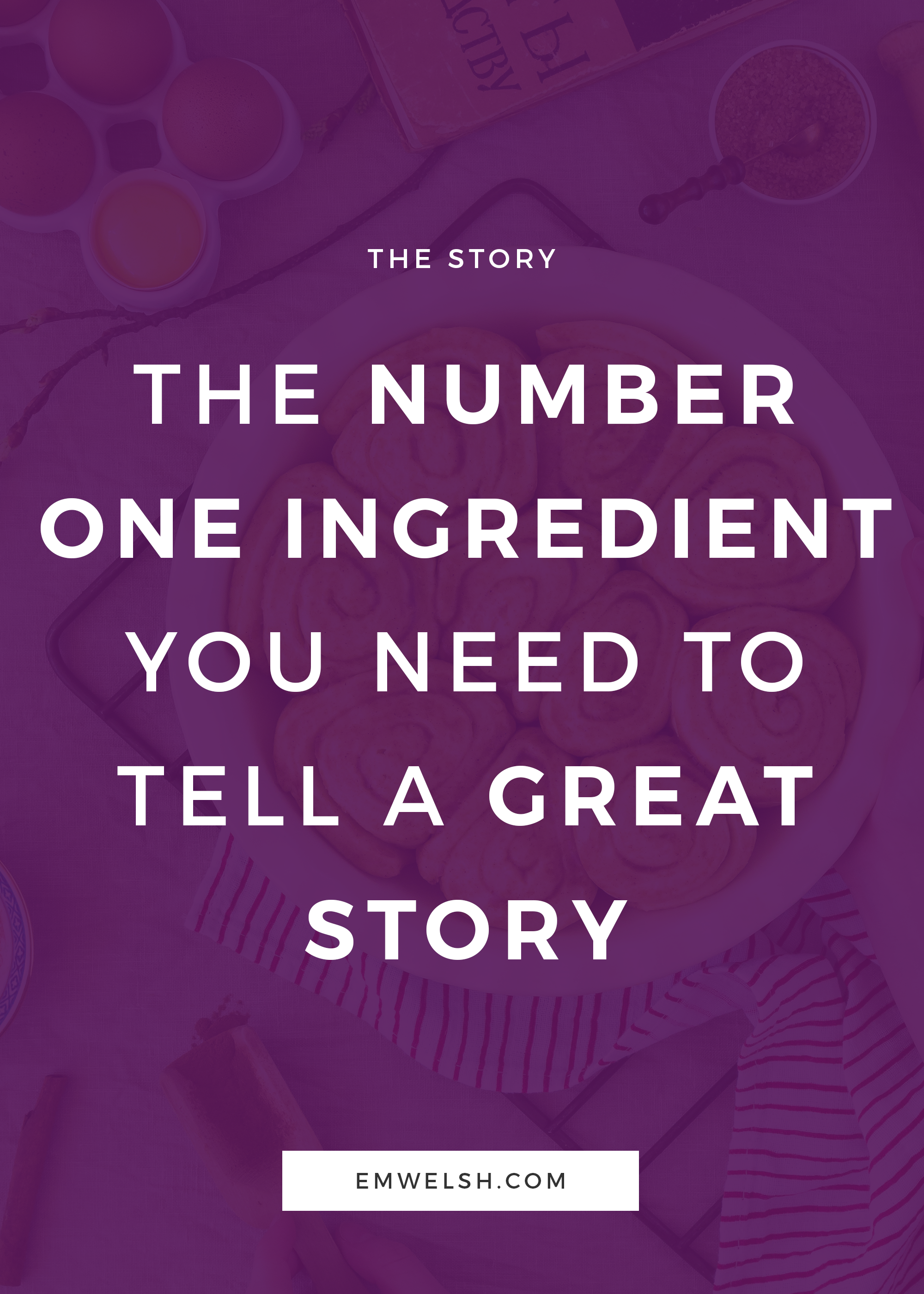The Number One Ingredient You Need to Tell a Great Story
/When it comes to telling stories, there are a lot of people out there telling you all the rules you should and shouldn’t follow. They tell you not to use adverbs in prose and to avoid voice-overs in screenplays. They tell you the key to a great story is character, but then they tell you it’s plot. With every article you read you become more and more doubtful about what is right for your story, or if you’re even doing anything right at all.
So you decide to try out writing a story in which you follow all the rules and you hate it. Something about it doesn’t feel right. You have technically hit every mark and every plot point you were supposed to hit and yet your story feels very very wrong.
So you toss it. You write a story in which you ignore all the rules and then you realize you didn’t even write a story at all. You wrote an image maybe, something that might work better as a painting. But you hate this piece just as much as the one you were following all the rules with, maybe even more. After a while you give up - or maybe you don’t - and you decide to just listen to the rules that resonate with you and ignore those that annoy you.
Or maybe you’re like me and you’re still just trying to figure it all out.
As someone who both loves and hates rules - I always follow them at first in every aspect of my life until I learn that sometimes rules are sometimes meant to be broken - I have become very flustered by all the guides to telling stories out there. I think to myself, “But what about the greats? They don’t have to think about all these rules when they write, do they?”
Perhaps they do or perhaps they don’t. I still can’t answer that question as I am not yet a “Great.” However, after many years of consuming copious amounts of stories in every form I could get my hands on, there has been one thing I’ve observed that exists in every story I have ever loved or considered great:
FUN.
Yep, you read that right. Fun. At first this answer may not seem so obvious, especially since it is something so difficult to measure. Yet if this is so fundamental to storytelling, why don’t we talk about it more often? After all, if that’s the key ingredient to a good story, surely people would be writing guides on it and creating programs that inspire fun and engaging stories.
Maybe it's because fun seems intuitive and not necessary to mention, or perhaps because teachers of the craft likely assume that their pupils already know about fun, but not enough, say about character. However, the reality is that nobody can teach you how to have fun in your story. Only you can teach yourself that.
So what do I mean by “fun”?
“Fun” is when the writer does something that is not “essential” to progressing the story. It is the thing authors cut out of their books when they want to tighten up their story and what the director omits when they read a script that is out of their budget.
et at the same time, it is often people’s favorite scenes, their most memorable moments, the very reason that people might even like your story and most important - it’s what makes your story yours and no one else’s.
Fun gives your story flavor. Think of it like food. Sure you could serve up a plain healthy meal that gets the job done. But it’s when you add your own flavor that people decide they want to come back for more.
All that is to say that this should not be confused with voice itself, but instead an aspect of your voice. Consider the director Quentin Tarantino. In his films, he always chooses to write scenes where people talk about food. Those scenes, though often capable of creating tension, are oftentimes created for the pure enjoyment of talking about food. They almost never progress the story and oftentimes not even the character, yet what do people talk about when they talk about Tarantino? “A Royale With Cheese.”
However, Tarantino films are inherently fun. People see them because of this more than anything else. But what about other stories? How do they achieve "fun"? After all, not all stories are considered that way, so how can that exist in things like Schindler’s List and The Color Purple? These are stories about deep human suffering, so where does the “fun” fit in for them?
While the technical definition of fun is something along the lines of "enjoyment or light-hearted pleasure," for the sake of this article we will consider it to be more like what I mentioned earlier:
"Fun is when the storyteller strays from what is deemed necessary for the plot."
With that in mind, let's consider a story like The Godfather, a film many people have seen that has also won many awards. Unlike books, films are nearly always cut down to some extent for the sake of keeping the plot clean and keeping viewers attention. That is what they are known for, so for the sake of making things clear I will use a film instead of a play or a video game, mediums I believe to be more open to random straying of the plot.
Many people talk about The Godfather and complain that the film is too long. Perhaps that's true - the opening wedding scene is around forty-five minutes long. However, while some people don't enjoy this opening scene and find it to be a waste of time, aficionados of the film often mention this opening scene to be their favorite. Within the wedding scene we not only meet the entire family, but we learn all the backstories as well.
But that could be established within ten minutes and often is. What takes up the remaining thirty-five minutes of the opening scene then? You guessed it - fun. Is this extensive scene necessary to progressing the plot? Absolutely not. But when watching the film, you can feel out the characters better than if you rushed through the introductions. You watch people interact and behave as themselves, see the family take a photo together and sing and laugh.
Now I won't go on to list all of that which occurs in the opening wedding scene - you can experience that with the movie yourself. But what I do think worth clarifying is that while "fun" in a story usually is something that is not necessary to the plot, it often does a lot to reveal a lot about character, a component that in itself enhances the main story. Fun is where your character lets lose and shows their true colors or where they pretend to be someone they're not for their own secret reasons. By letting your characters get to this point, they will not only become more memorable, but so will your story.
Can I have too much fun?
I’m a big believer that if you are having fun when you tell your story, everyone else will too. But sometimes we as storytellers can get a bit carried away when we’re having a good time. And while I cannot tell you how much fun is too much, I can say that if your story is so "fun" that nobody understands what the main conflict is or where the story is going, you may want to weed out some of the crazy moments in your story. Granted, this is if you are choosing to tell something conventionally. If you want to make a Terrence Malick film, have as much fun as you want.
How to Have Fun
As I mentioned, nobody can teach you to have fun. It’s like teaching someone how to become angry or sad. It’s intuitive, something everyone learns on their own and defines on their own. All I can suggest is that when your heart tells you to write a weird scene or chapter, just roll with it. You don’t have to keep the scene in your final draft or even show it to anyone if you are so embarrassed by it. Just see where it takes you.
As a kid, you probably told some great, albeit very weird, stories. This is because you wrote without inhibitions about plot or character and just followed your heart. As a result, you likely added flare to your story that you wouldn’t have otherwise. Maybe you wrote something that made no sense at all, but it was certainly one thing: unforgettably and originally you.
By acknowledging the necessity of fun in a story again, you’ll find yourself reverting back to this imaginative childlike state, but with more regards for conventional structures so that everything actually makes sense. Over time, you'll find that your stories will evolve into something much more memorable again and you'll hopefully begin to enjoy your work even more.
Of course, I’m just another person telling you how to tell your stories. So take it all with a grain of salt.
What about you? Have you ever considered how you have fun in your stories? Or do you feel bogged down by the rules and making sure your plot is perfect?


